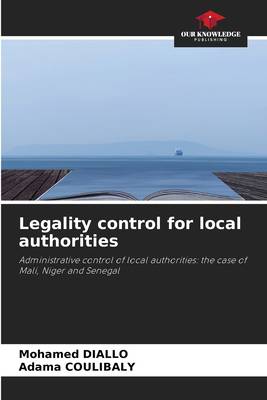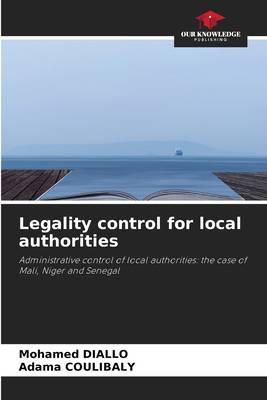
Bedankt voor het vertrouwen het afgelopen jaar! Om jou te bedanken bieden we GRATIS verzending (in België) aan op alles gedurende de hele maand januari.
- Afhalen na 1 uur in een winkel met voorraad
- In januari gratis thuislevering in België
- Ruim aanbod met 7 miljoen producten
Bedankt voor het vertrouwen het afgelopen jaar! Om jou te bedanken bieden we GRATIS verzending (in België) aan op alles gedurende de hele maand januari.
- Afhalen na 1 uur in een winkel met voorraad
- In januari gratis thuislevering in België
- Ruim aanbod met 7 miljoen producten
Zoeken
Legality control for local authorities
Administrative control of local authorities: the case of Mali, Niger and Senegal. DE
Mohamed Diallo, Adama Coulibaly
Paperback | Engels
€ 93,95
+ 187 punten
Omschrijving
Between 1990 and 2022, most West African states introduced a new form of administrative control, while abandoning the guardianship system. Trusteeship control was seen by many specialists as a brake on the principle of free administration by local authorities. In many countries, this form of control has been abolished or rendered meaningless. Administrative control is the verification by the State representative of local bodies and certain local acts. It differs from jurisdictional control, which is exercised by the administrative judge or by the ordinary law judge. So it's important for us to ask the following question: How are local bodies and acts controlled by the representative of the State? After an overview of the administrative control of local authorities in Mali, Niger and Senegal, we will raise points of convergence and divergence.
Specificaties
Betrokkenen
- Auteur(s):
- Uitgeverij:
Inhoud
- Aantal bladzijden:
- 60
- Taal:
- Engels
Eigenschappen
- Productcode (EAN):
- 9783639815313
- Verschijningsdatum:
- 15/04/2025
- Uitvoering:
- Paperback
- Formaat:
- Trade paperback (VS)
- Afmetingen:
- 152 mm x 229 mm
- Gewicht:
- 95 g

Alleen bij Standaard Boekhandel
+ 187 punten op je klantenkaart van Standaard Boekhandel
Beoordelingen
We publiceren alleen reviews die voldoen aan de voorwaarden voor reviews. Bekijk onze voorwaarden voor reviews.









